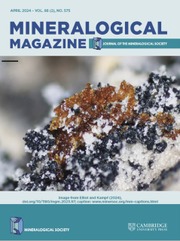Article contents
The origin of igneous layering in the Nunarssuit syenite, South Greenland
Published online by Cambridge University Press: 05 July 2018
Abstract
The rhythmic modal layering in the Nunarssuit syenite has a vertical extent of >150 m and a lateral extent of >15 km. Individual layers average 20 cm thick and grade from a relatively melanocratic base into more leucocratic syenite over a distance of up to 5 cm. The major cumulus phases are alkali feldspar, ferro-salite/hedenbergite and fayalite. Two basic stratigraphic cycles have been identified in which faint modal layering becomes more pronounced up section, each cycle terminating in a thick melanocratic zone. Slumps, slump breccias, troughs, micro-rhythmic layering and one occurrence of crossed layers were observed.
Qualitative grain size analysis indicates no size sorting in the layers. Preliminary application of crystal size distribution theory to ferro-salite/hedenbergite and fayalite from the bases of individual layers gives results which may be interpreted as indicating a relative lack of coarse grains. If the layers were deposited from density currents it would be expected that the coarsest grains would be deposited close to the source of the currents. There is no evidence in the majority of the syenite that the cumulus pile underwent compaction during crystallization.
There was little, or no, primary chemical variation across individual layers. Whole-rock compositions and the ferro-salite/hedenbergite, fayalite, biotite and amphibole present in the syenites show a slight, but statistically significant, increase in the ratio Mg/(Mg+Fetotal), from the base up to the top of the layered succession.
A model is suggested in which successive magma layers become more ferroan towards the top of the chamber. Cooling is concentrated at the top of the chamber and layers of magma crystallize sequentially, the uppermost, ferroan layers first. As layers of magma cool and crystallize they sink, as crystal-melt plumes, to the bottom of the chamber where they source density currents from which layers are deposited.
- Type
- Research Article
- Information
- Copyright
- Copyright © The Mineralogical Society of Great Britain and Ireland 1998
Footnotes
Present address: Macaulay Land Use Research Institute, Craigiebuckler, Aberdeen AB15 8QH, UK
References
A correction has been issued for this article:
- 9
- Cited by
Linked content
Please note a has been issued for this article.


